'I’ve never had to struggle like this': Residents raise alarm about growing need for food help
The message was short but spoke volumes: "Does anyone need a package of chicken? Needs to be cooked ASAP. Pick up in Eau Gallie.”
The six pounds of chicken breasts were thawing and fast approaching the best-by date. Within minutes of the message being posted on a grassroots support group's Facebook page, people responded yes. One woman didn’t have transportation and wanted to know if she could walk to collect the meat. Two more people posted, asking to be next in line should the first respondent not show.
"It was picked up within 30 minutes of me posting it," said Shannon Stickney, who gave away the $12 worth of chicken.
"This prompted me to clean out my freezer and pantry that weekend. I was able to put together two bundles of food for two other families. It hurts my heart that so many people in this community are starving and so many of them are homeless. I know what others are going through and how they feel.”
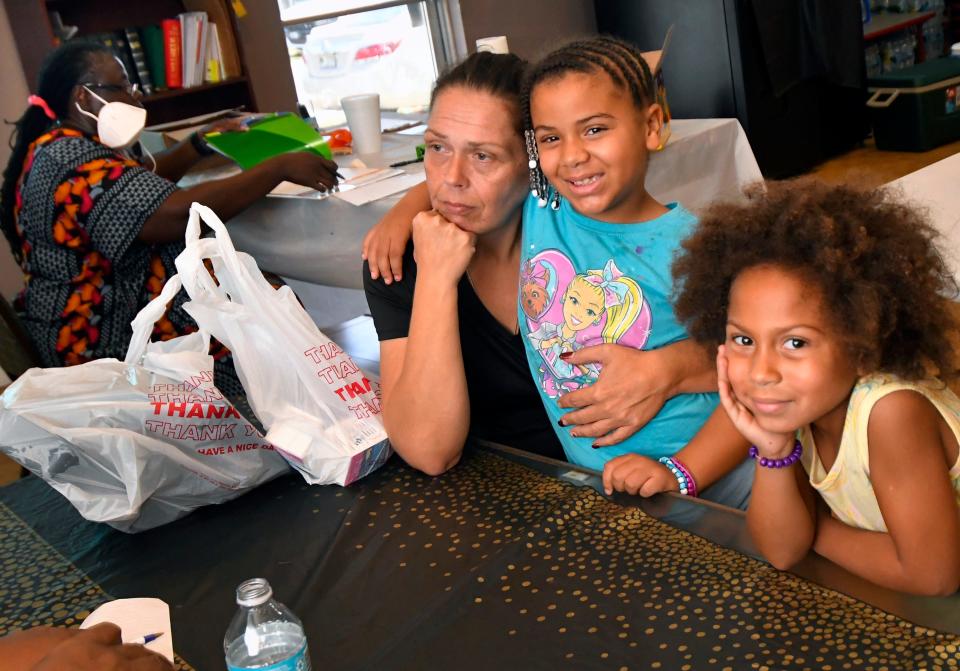
Hunger is a pervasive and persistent issue across Brevard County. It affects the homeless and those out of work but also residents with jobs and a roof over their heads, those left with very little money for food after paying rent, gas, utilities, student loans, medical bills and more.
When Stacy Higginbotham, a mother of four, wheels her grocery cart through the aisles at a Palm Bay Walmart, she’s looking for foods that can last — rice and cereal — while doing a version of survival math in her head, mentally dividing $40 worth of ground beef into 11 meals for five people.
The cost of food is causing many to go hungry. Our neighbors need your help
Universal free lunch program comes to an end for Brevard Public School students
Food program for south Melbourne children continues as families struggle with inflation
Brevard County survey finds many social factors that contribute to health are worse now
When people scour Facebook for food help at midnight, we have a problem
Aging Matters in Brevard works to serve 500 seniors on Meals on Wheels waiting list
Jackie Shelor, a widow with health issues, hits food pantries weekly. She wishes Aldi or Walmart — stores with more affordable prices — were closer to her home. Every dime counts.
"I love seafood but can't afford it and I don't eat a lot of meat due to the costs," she said. "I have never been rich, but I have never had to struggle like this — it's tough to handle some days."
How many people are hungry in Brevard? That’s not an easy question to answer but ask anyone involved in helping them and they'll tell you: too many, and the numbers are only growing.
Statewide, an estimated 3.9 million of Florida’s 21 million people are struggling with food insecurity, according to statistics from Farm Share, a nonprofit food bank that distributes fruits, vegetables, and meat to people in need from Miami to Melbourne. Food insecurity means those lacking consistent access to enough food for every person in a household to live an active, healthy life.
Here’s what we know about the Space Coast:
The faces of hunger in Brevard
The hungry in Brevard defy demographic stereotypes. Some are the more traditional impoverished. But there’s a growing number of people who’ve never been in this situation before.
It's a mother skipping a meal so her children can eat or scouring social media pages for help.
It's a father planning food pantry visits around work, childcare, or school to fill his bare refrigerator shelves.
It is the minimum wage worker who must stretch a family’s budget to fill the gaps between paychecks and the next round of food benefits.
It’s when a bowl of spaghetti with a watery sauce served at a summer feeding program looks like a feast to a child.
And it’s a feeling of helplessness for those trying to serve their community as morepeople reach out in need but donations remain stagnant or decrease even as food costs grow. Numbers released in August by the Bureau of Labor Statistics tell that grim story: Grocery costs have jumped by 13.1% since summer 2021, the largest annual increase since March 1979.
“We are seeing more and more people coming in. Many are hungry,” said Mary Johnson, pantry program administrator at the Edna W. Jackson Food Pantry operated by Greater Allen Chapel FoodAfrican Methodist Episcopal Church in Melbourne
There, locals pick up bags of canned goods, ramen noodles and meat from shelves stocked with goods donated by church members. They're back the next month for the next bag.
In a telling move, pantry workers have seen some young people — including children — pop open a can of food like ravioli and eat it straight from the can. That didn't happen before.
“To add another dynamic, last week for our hot lunch we served 191 meals. When we first started, in October of last year, it was 60 meals," Johnson said.
Early one summer morning, it was hot. Sticky, take-your-breath-away hot.
But children — and a few parents — braved the summer heat to step into the Thy Kingdom Come Church off of Pelham Street in south Melbourne.
Inside, there was a godsend for 49-year-old Rachelle Thompson and her two children.
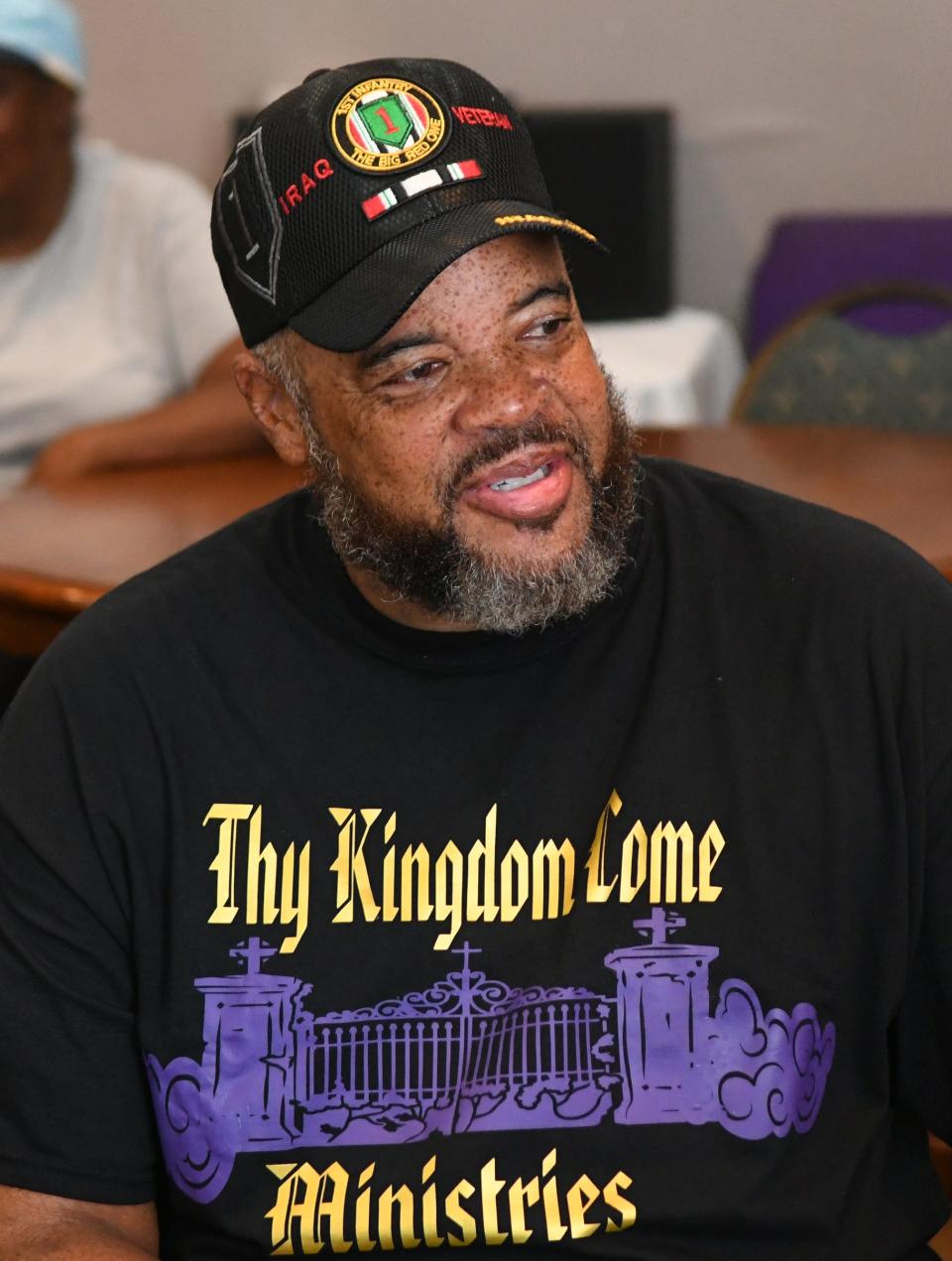
Volunteers with the Read and Feed Program had set up to-go boxes loaded with chicken smothered in gravy over white rice, mixed vegetables and a piece of bread, much of it funded with a $5,000 grant from the Palm Bay Police Department.
There was fruit. Water. And free books, including Harry Potter, dictionaries and more.
The kids kept coming — at the peak, 94 of them.
“Things like this help,” Thompson said. “I’m here because I don’t have enough right now to take care of my kids" even with her $400 in food stamps each month.
Inflation has taken a chunk out of that, she said.
“I’m buying noodles, ramen, hot dogs. The groceries are so expensive right now, but you have to feed them, and you have to think about their nutrition,” Thompson said.
Palm Bay Police Officer Parker Farmer helped gather bags loaded with supplies. He sees the impact of the sluggish economy not only in the room, but also on the streets that he patrols.
“I’m hearing about it on all ends, even from some officers who say, ‘Hey, I got to work some extra details to grab some groceries or pay the mortgage,'" the 41-year-old community relations officer said.
The last week of July saw almost bare shelves at the North Brevard Charities Sharing Center's pantry in Titusville. It's funded largely by donations from the public although they do also order some food from Second Harvest for pennies on the dollar. A United Way of Brevard and Publix drive meant there was at least a large supply of peanut butter and jelly until shelves were replenished.
“We're getting drawn down on food at a much more rapid pace than what we used to be, and the lines are longer,” said Brian Walton, executive director.
“More people are showing up than ever before … we try to accommodate that."
While breakfast will continue to be offered free for all Brevard Public Schools students this school year, for many, Saturday and Sunday could be lean days without the help of a nonprofit organization founded in 2010 to serve one school. Today, that nonprofit, The Children's Hunger Project, distributes 3,200 weekend food packages through about 50 Brevard elementary schools.
While staff doesn't meet the families, they do know their stories — and in some cases, the stories of need speak to desperation.
"Some of these parents are working two and three jobs, and one person can't work because they're trying to take care of their children. Some have extended family living with them," said Cheryl Cominsky, executive director.
"They're not able to do it. There's no making ends meet ... so many of our kids, their primary food sources are breakfast and lunch at school. And that's why we do what we can, to bridge that gap."
COVID-19 exacted many-sided toll
Show up early on a Monday at the Central Brevard Sharing Center in Cocoa. You won't be alone.
Always, there's someone waiting either for their every-60-day allotment of staples through the Emergency Food Program, or for the lunch that will be served later in the morning. Or help with utility bills or prescriptions. Or all of the above.
"On a personal level it all takes a toll," said David Brubaker, Sharing Center president and CEO. "Seeing the eyes of hunger, or a person who is struggling with sobriety, or one who sees no hope in their lives, is hard on the eyes and heavy on your heart."
Between January and June 2022, the Emergency Food Program provided food to 6,657 people. On average, registrants eat there 20 times a year.
Brubaker said the past few years have been some of the hardest he's seen in his 20-plus years at the Sharing Center.
The COVID-19 pandemic continues to exact a toll in terms of volunteers, donations and also people's personal economic stability. Many who'd been living paycheck to paycheck lost their foothold.
Pamela Gunthorpe, executive director of the South Brevard Sharing Center, said she's seeing working people make a choice: pay for housing or pay for food.
In May, 850 households — some with multiple family members — requested food help from the Melbourne nonprofit. In June, that number more than doubled, to 2,100.
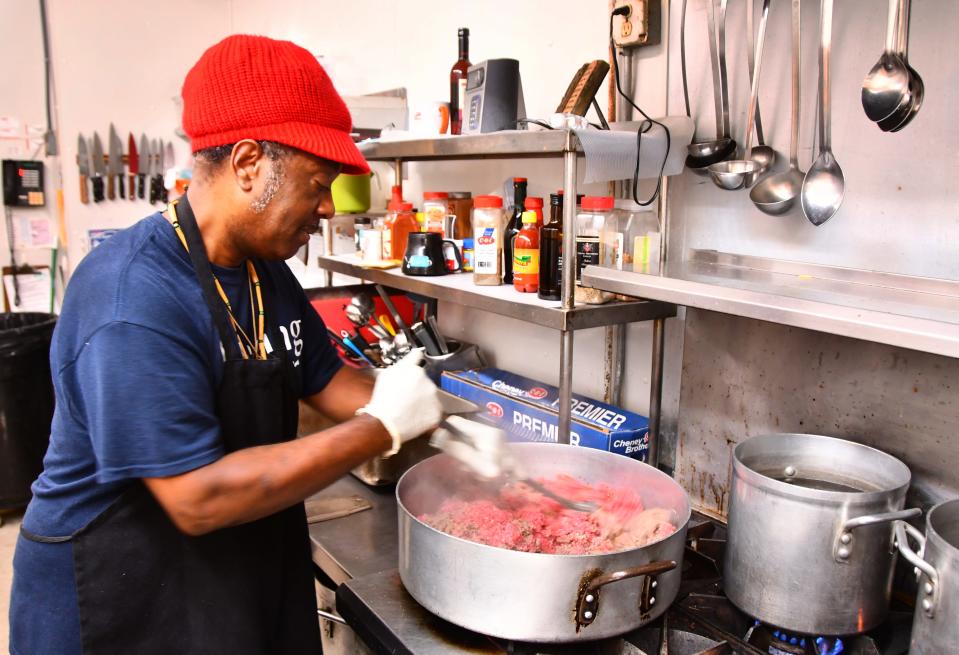
"In my opinion these people are doing everything they can to afford their skyrocketing rent and forgoing food, and then reaching out to local food pantries," Gunthorpe said.
"And the ones struggling the most are the disabled, elderly and those who work service sector jobs."
She recalled the plight of a pregnant homeless woman who spoke in front of the Brevard County Commission in March 2022, telling them how she had "gone all throughout your county trying to find some kind of help.”
"That shouldn't be how it is," Gunthorpe said.
"That one person found a way and the courage to step up in front of a group to tell her story. But hundreds if not thousands of our neighbors across Brevard are in a similar situation, just trying to get by. Our elected officials need to think about their entire constituency, not just the ones who contribute to their campaigns and have the wherewithal to reach out to them."
Is the government helping enough?
For the current year the Housing and Human Services Department has contracts totaling $547,000 for Meals on Wheels, a Community Kitchen Program, and a Community Nutrition Program, said Ian Golden, the county's Housing and Human Services Department director.
"These are a combination of general revenue and other funding sources included in our annual budget," he said.
The Brevard County Commission has not given final approval for next year’s budget yet.
Brevard County received $105.03 million in federal CARES Act funds, money meant to assist people affected by the coronavirus pandemic.
The bulk of the money went to county and municipal governments, to medical and public health programs, and to public safety. Another $25 million was divided among the five commissioners who in a 3-2 vote allocated themselves $5 million apiece to spend as they saw fit. The commissioners spent the money on a variety of things, including a public safety fund, reimbursing Parrish Medical Center for COVID-related expenses and grants for small businesses and nonprofits.
Just 10.1% of the $105.03 million was targeted for individuals and families, and to food assistance programs — in the case of the latter, specifically, $4 million for a "food stability program."
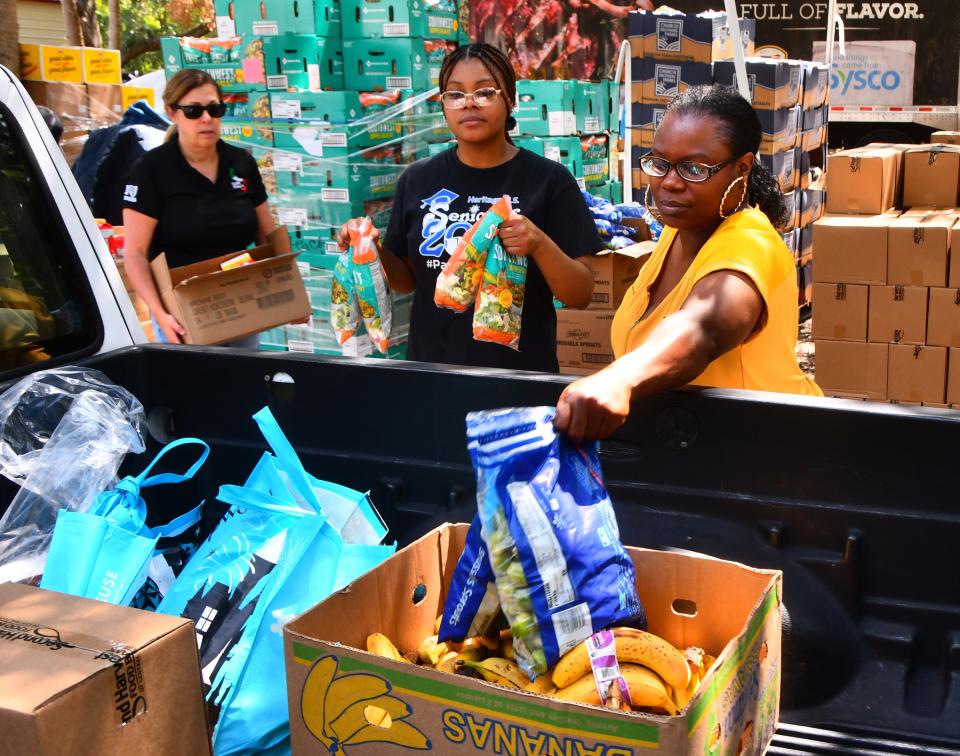
That venture expanded traditional food pantries and food banks along with "pop-up" food pantries at churches and other locations; provided weekend meals to children; and offered individuals $50 in "CARES Act dollars," in the form of tokens, to use at farmers' markets for fresh fruits and vegetables and other food items. In sum, $1,944,067 worth of tokens were redeemed by the end of the program.
"By the time we phased out the food stability program funded through CARES, a little over $4.6 million in total was expended on it," said Golden, adding that additional CARES funds were requested and received.
Golden added that the commissioners have continued to authorize funds to be used for nutrition programs.
CONSIDER SUBSCRIBING TODAY: Help support our local journalism
"Specifically, we have received two tranches, totaling approximately $2.2 million in Community Development Block Grant (CDBG) coronavirus funds and the Commission twice approved conducting Request for Proposals (RFPs) with multiple priority areas including community nutrition," he said.
The need doesn't seem to be slowing.
In the south part of the county, two months ago, single mom Stacy Higginbotham was forced to quit her job after the sudden death of her family's babysitter.
She and her children, ages 10, 7, 5 and 2, live in Section 8 housing in south Melbourne.
Since the pandemic, her family has been on the edge financially but now, with inflation eating away at her budget, that edge is at a tipping point.
Every weekday during the summer, Higginbotham and her children walked from their apartment to the United Way of Brevard's Read and Feed program, which provides food, mentoring and free books to children. This past summer, the United Way program operated at 24 sites.
Higginbotham watched her children break into smiles over the hot, nutritious meals prepared by volunteers. The spaghetti served one day got two thumbs up from one of her daughters.
“It’s a struggle and I’m tired,” Higginbotham said.
She described pulling milk from a refrigerator shelf at Walmart, focused not only on the price but the question of how long it would last.
“I spent over $400 for groceries and it looks like I have nothing. I try to go everywhere that’s cheap,” Higginbotham said
“You get a lot of rice, things you can stretch out. I spent $40 on hamburger, so that’s 11 meals. I have to plan everything out.
"Sometimes I don’t eat so they can. All they know is that they are hungry and I’m up late at night crying, trying to make sure they eat.”
Brevard residents step in to help
On any given day, on the Mutual Aid Brevard Facebook page, you'll find posts from people of all ages and races, from young, single mothers to couples with children to grandparents raising their grandkids; from the homeless to the working poor.
The pandemic-inspired group, which had almost 17,000 members as of Labor Day, helps people find food and other assistance on the Space Coast. More than two years after its founding by Satellite Beach resident Stacey Patel, she and administrators are swamped with posts and requests.
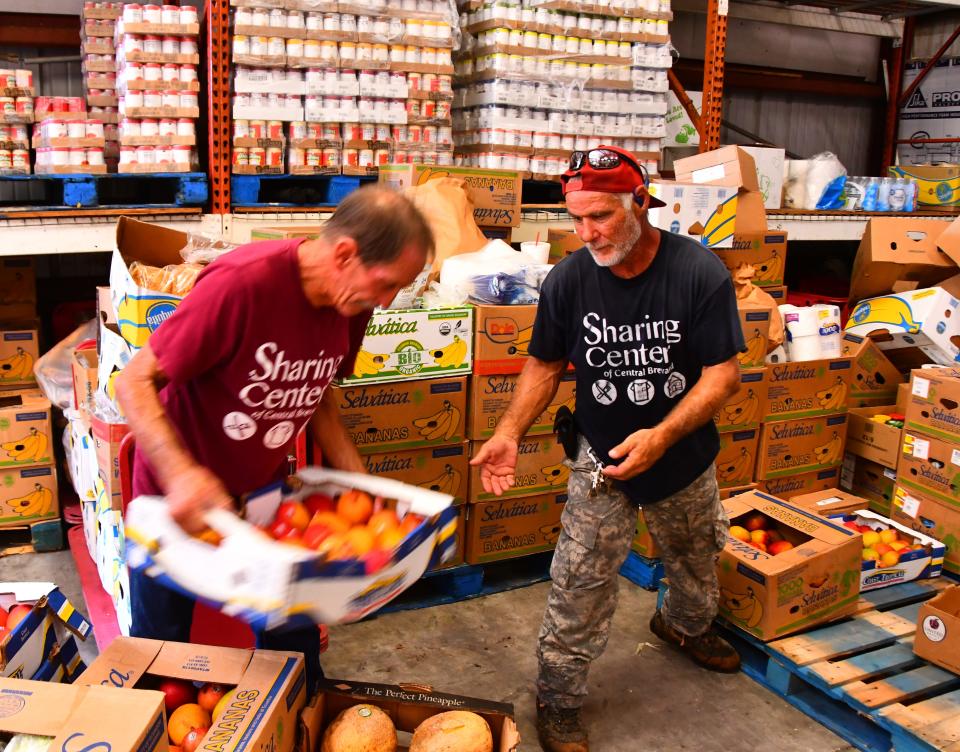
Over the course of June and July, the group had 12,230 posts and comments, and 381,895 views.
Post and comment volume has increased 187.65% since June 2, and 1,322 new members have joined in the last 60 days.
"As grocery, rent, and gas prices rise, the needs are only expanding," said Patel.
"I don’t know if fed folks can imagine the kind of desperation and suffering our neighbors are facing — even those working multiple low-wage jobs in our community cannot feed and shelter themselves and their children. It’s hard to fathom the barriers folks face to make a living, from sick family members to mental health crises to domestic violence to licenses suspended for court debts that can never be paid."
When a local resident offered a box that included a “few cans of Spam, a case of cup 'o noodles” and other items, four families tried to claim the box in less than 30 minutes.
This is not atypical. In the four days ending Aug. 2, Mutual Aid had 14 requests for food help.
They included parents in a “panic search for formula," families in quarantine looking for meals, a man searching for a “spare loaf of bread," a homeless pregnant woman looking for water, and a mom of “a three year old and an 11 year old that has to eat” who said “anything will help (even if it's just for them).”
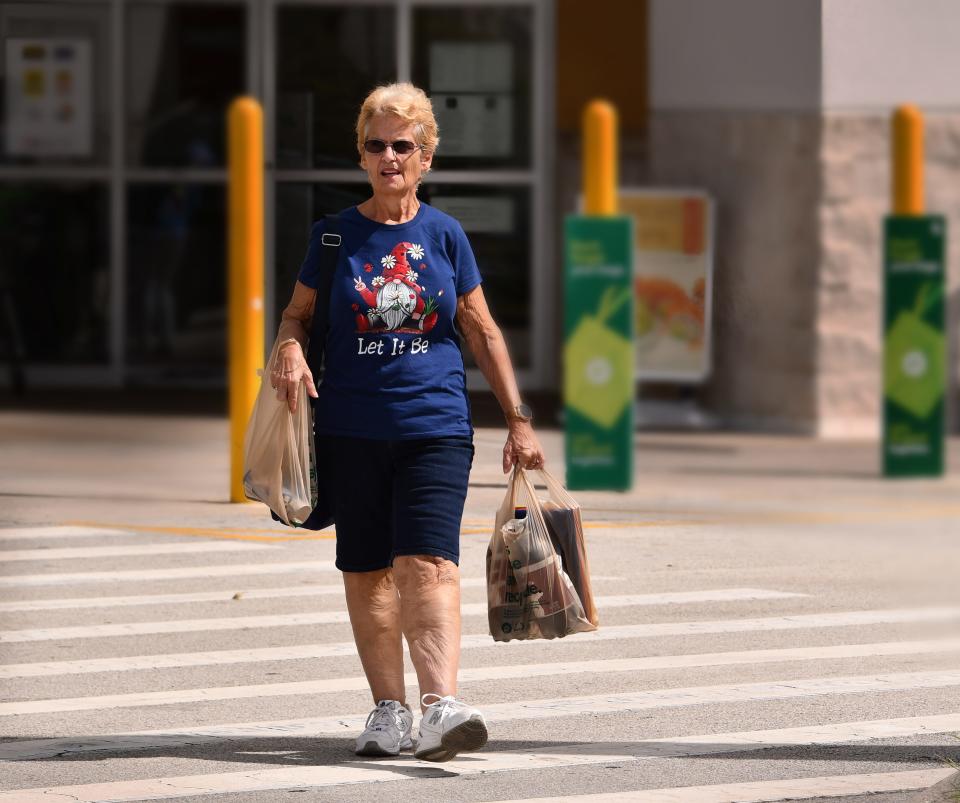
Jackie Shelor of Palm Bay, 64, looks to Mutual Aid often for support, both physical and emotional.
Widowed 10 years ago, she's had a slew of medical issues, some requiring major surgery, over the past few years.
Shelor's two sons, both in their 20s, live with her.
One son, Jake, is an independent contractor whose checks might range from nothing to $500. He chips in on expenses. Her other son, John, is looking for work and interviewing.
Her total income for the month: $1,439 in Social Security disability income.
She pays $178 per month for Medicare, $473 for her mortgage, $289 to FPL, $80 for internet, $150 for car insurance and $110 per quarter for trash pickup.
That doesn't include medical bill payments.
Or needed repairs on her home, which are going uncompleted.
Or food.
So Shelor, too, hits food pantries weekly.
"My biggest expense is food and beverage and I spend at least $500," she said. "And those are the basics. I use a smart TV and watch free streaming shows rather than cable ... I would love to get insurance for my sons but they have quoted me $89 per month for each of them."
Nonprofits pitch in to tackle hunger across Brevard: Here's how you can help
For those with children in school, the end of the universal free school lunch program that helped families during the COVID-19 pandemic means more budget tightening.
One mother posted on the Mutual Aid Brevard site shortly after school started, asking for help with some snacks for her child and sharing a picture of the zero balance on her food benefits card.
"Anyone be willing to order my son some snacks for school unfortunately had to renew last month so I got them on the 4th of august and don’t get them again till sept 21 and he’s running really low (yes I work full time with bills going up it’s just harder)," she wrote.
Another member of the group sent snacks to the mom via Amazon.
"If we want to build a thriving community where folks aren’t suffering and struggling just to survive, we must be willing to speak out about our own challenges without shame," Mutual Aid founder Patel said.
"And we must bear witness and truly be present to the pain of others — including those whose lives are very different from our own."
Overwhelming, exhausting times
Rachelle Thompson and Stacy Higginbotham are like countless other Space Coast residents, and millions of Americans. While they don't see or expect any quick fixes to their struggles, their bottom line is this: My family and I need to eat.
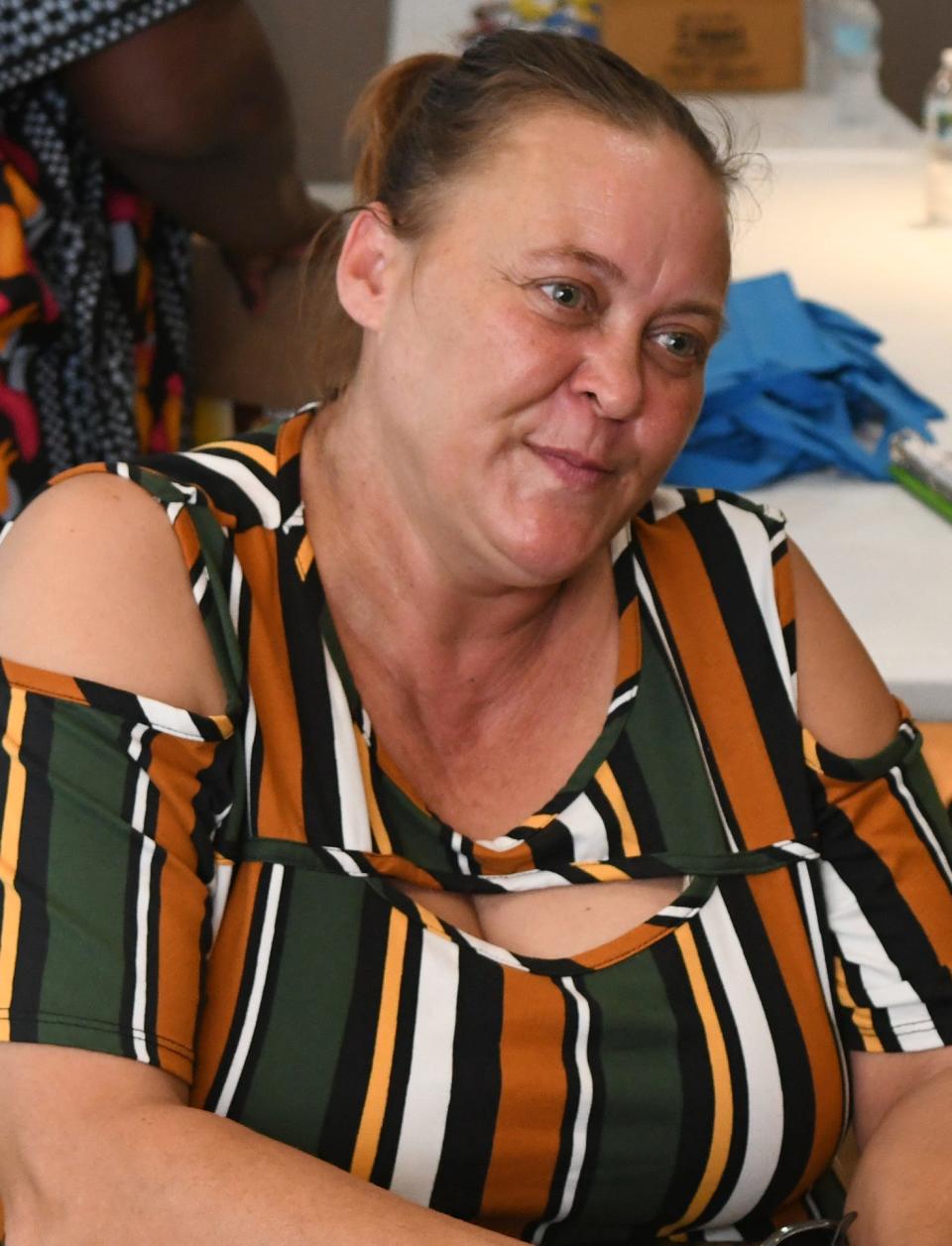
These two Brevard moms are just grateful to be able to put food on the table; to feed their children, when their bank accounts, their shelves and their morale are stripped bare.
Both would go without before they'd let their children go hungry. Both do their best to hide their concern. Both are fearful about what's next.
"This is the longest I've been without a job," Thompson said adding that she is very worried about what the future holds.
"It's tiring," she said.
For Stacey Higginbotham, watching her children get a solid meal helps ease her worries — but only for a brief while.
In late July, Gov. Ron DeSantis announced, as part of the state's budget, "one-time payments" of $450 per child to 59,000 Florida families, including foster families, adoptive families and single mothers who met eligibility requirements.
"This one-time payment can be used for anything from buying diapers to fueling at the pump... please accept this payment as a form of gratitude and acknowledgment for all that you do to help nurture Florida's future. God bless you, and God bless the great state of Florida," the letter received by recipients said in part.
A week after the announcement, Higginbotham learned hers was not one of the families meeting the guidelines for the one-time checks.
She fears a recession and food shortages.
“I can’t even watch the news. If that happens, it’s going to be hit or miss. We’ve already been adjusting; our shopping has changed,” she said.
“I’m just praying we don’t become homeless.”
Your support of local journalism helps us produce issue-related stories like this piece. We believe it’s important for the community to understand the struggles some of our neighbors are facing. But reporting these kind of stories takes many hours of hard work. If you’re not already a subscriber, please consider supporting us at floridatoday.com/subscribe.
This article originally appeared on Florida Today: Hungry in Brevard: Young, old, working, retired face growing struggle

